-
Online version here:
https://www.ireland-information.com/jul15.html
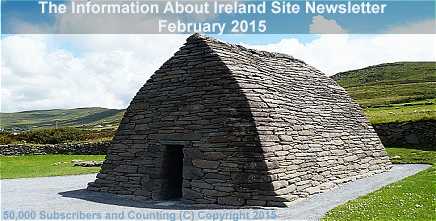
|
||
|
KEEP THIS NEWSLETTER ALIVE!
NEED A WEDDING, ANNIVERSARY OR BIRTHDAY GIFT? |
||
|
Shop Online at WWW.IRISHNATION.COM
|
||
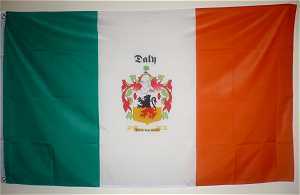
Family Crest Flags. White-Background or Ireland Flag |

Marvelous Family Crest Shields and Plaques |

MASSIVE REDUCTIONS!!! Stunning Family Crest Rings |
| More Gift Ideas From Ireland | ||
============
IN THIS ISSUE
============
=== News Snaps from Ireland
=== Countess Markievicz - The Rebel Countess
=== The Origin of the Ogham Language
=== Gaelic Phrases of the Month
=== Monthly Free Competition Result
Popular Articles from Recent Newsletters:
Conan and the Great March of O'Sullivan Beare - A Conan Story
'Conan Pays His Debts' - a story
Inventions You Never Knew Were Irish
==========
FOREWORD
==========
|
Hello again from Ireland where this month we have a timely reminder of the life of the famous Irish rebel, Countess Markievicz. With the 1916 anniversary looming there are going to be a lot of retrospectives on the lives of those involved in the rebellion that eventually led to Irish independence.
Please share this newsletter with your friends and family! Until next time, Michael |

P.S. Please DO FORWARD this Newsletter to a
friend or relative. If you have a website or Face book
page or Blog (or whatever!) then you can help
us out by putting a link on it to our website:
www.ireland-information.com
==========================
NEWS SNAPS FROM IRELAND
==========================
|
IRELAND'S TOP TOURIST TOWNS REVEALED With Dublin, Cork and Galway dominating the tourist scene in terms of 'big cities' the focus has turned to smaller towns that offer the most to visitors. It comes as no surprise that five of these towns are in County Kerry with the south-western County continuing its reputation as the tourist capital of the country (in the opinion of many people). 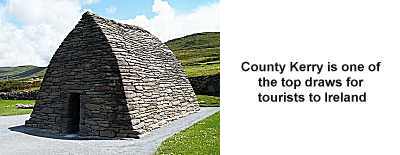
Fifteen towns have been short-listed to win the 'Failte Ireland Tourism Town Awards' with the winner to be announced later this year. The 2014 winners were Westport and Kinsale but neither of those towns were short-listed this time around. Noticeable absentees also include such tourist hot-spots as Dingle, Kenmare, Lahinch, Bundoran, Donegal, Sligo and Clifden, to name but a few. Read more about this Story at the Ireland News Bldg AMAZING ARCHIVE OF IRISH VIDEO RELEASED An amazing collection of vintage newsreels and reports have been released by British Movietone and the Associated Press and uploaded to Youtube for public viewing. 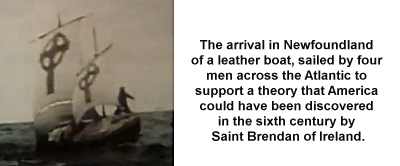
Among the AP collection are over half a million video clips with one million minutes of Irish-related content. The truly fascinating footage provides an incredible insight into life in Ireland as far back as 1895. To access Irish coverage in the British Movietone collection: https://www.youtube.com/channel/UCHq777_waKMJw6SZdABmyaA/search?query=ireland To access Irish coverage in the Associated Press: https://www.youtube.com/channel/UCHTK-2W11Vh1V4uwofOfR4w/search?query=ireland IRISH FOOTBALLER TURNS HIS BACK ON BRITISH NATIONAL ANTHEM It is either a storm in a tea-cup or a national insult. Both attitudes to the actions of West Brom footballer James McClean are certainly in evidence within the British and Irish media coverage. 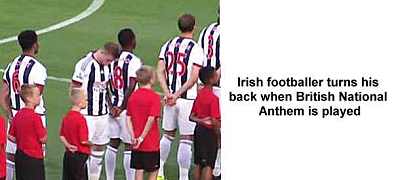
The 26-year-old Irish international footballer had only just joined English club West Bromwich Albion when he made the headlines by turning his back when the British national anthem was played at a friendly match in Charleston, South Carolina. It is not usual for the anthem to be played before football matches in England, although the tradition of playing the US anthem at major sporting events is extant. McClean, who hails from Derry, has been subjected to a tirade of abuse from many quarters for this stand with his Team Manager, Tony Pulis, warning him against any such future demonstrations. It is not the first time that the speedy winger has hit the headlines for his political beliefs. In 2012 he famously refused to wear a poppy flower as a symbol of Remembrance for those who died in the first World War. Many feel that the act of wearing a poppy has been hijacked as a symbol of British nationalism with one commentator, the Channel 4 television presenter Jon Snow, famously labelling the compulsion/obligation to wear the poppy as 'poppy fascism'. In an age when so many sportsmen and sportswomen are seen as little more than money-grabbers with zero loyalty to anyone it is on the one hand refreshing to see a young man stand up for his beliefs, regardless of political persuasion. On the other hand it will be interesting to see what might happen if West Brom should reach a Wembley Cup final where the British national anthem is always played and where the players are often greeted by the British Royal Family. LONDONDERRY TO BE RENAMED DERRY In Ulster symbols matter a whole lot more than they matter in other parts of the world. The decision therefore by Derry City and Strabane District Council to change the official name of the town from Londonderry to Derry has been met with predictable anger by Unionist politicians in Ulster who are outraged at the proposal. 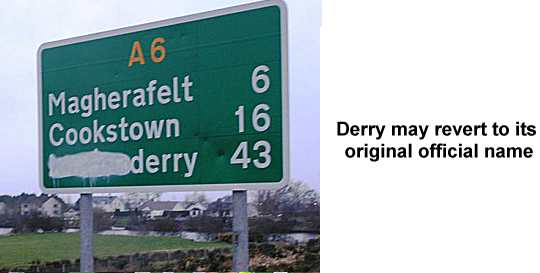
The council have now made an approach to the Northern Ireland Environment Minister, Mark H. Durkan of the SDLP, for instruction as to how best to proceed with the name change. The proposal is certain to be enthusiastically opposed by those loyal to the English Crown. The 'London' prefix was added to the town name in 1613 as a means of exerting dominance by the English and Scot settlers who had defeated the Gaelic order. DUP councillor David Ramsey expressed the Unionist viewpoint more calmly than most: 'If republican and nationalists politicians in the city are serious about equality and a shared future we should be celebrating our connection with London. We should also be celebrating our diversity of our British and Irish cultures and history which includes the historical name Londonderry after the stonemasons who built the city. It creates sectarian tension and how does this reflect upon the nationalist republican goal to achieve a shared future?' It remains to be seen if the latest attempt to have the name of the town changed back to its original form is successful. All previous attempts have failed. DECENT WORLD CUP DRAW FOR IRISH SOCCER TEAM There was some relief at last for embattled Irish manager Martin O'Neill with the announcement of the qualifying groups for the 2018 world cup to be held in Russia. 
Ireland was drawn in Group D with Wales, Austria, Serbia, Moldova and Georgia. The progress of the Welsh team with their talismatic forward Gareth Bale spearheading their attack has seen the tiny nation promoted as one of the top seeds in the competition. Not the easiest group imaginable but certainly not the worst either. Although the Welsh are flying high at the moment and look certain to qualify for next years European Championships a lot can happen over the course of the next two years. Austria, Serbia and Ireland will all fancy their chances agains the Welsh although it has to be conceded that the Irish team do not currently instill fear in anyone. |
|
KEEP THIS NEWSLETTER ALIVE! Free Mount with ALL Family Crest Prints, Framed or Unframed 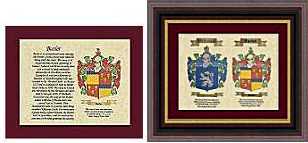
Order from Here |
Find Your Name in our Gallery of Irish Coats of Arms:
| A | B | C | D | E | F |
| G | H | I | J | K | L |
| M | N | O | P | Q | R |
| S | T | U | V | W | Y |
THE PERFECT WEDDING, ANNIVERSARY OR BIRTHDAY GIFT!
We have worldwide names available.
Get the Coat of Arms Print, Signet Ring,
Mugs, Plaque, Tee-Shirt or Clock for
your name at:
https://www.irishnation.com/familycrestgifts.htm
|
=========================================== COUNTESS MARKIEVICZ - THE REBEL COUNTESS =========================================== Of the many stories of revolutionaries that emerged from the early part of the twentieth century in Ireland one of the most remarkable involves the woman who was born Constance Gore-Booth in 1868. 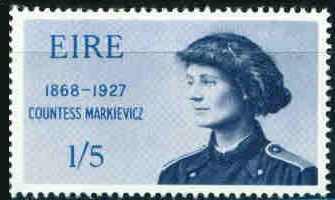
She was born in London to Sir Henry Gore-Booth, the famous arctic explorer, who was an Anglo-Irish landlord. Her father was not typical of his type and administered his lands with a degree of compassion for the peasantry who farmed it. Such was his mercy that he is reported to have provided famine relief at his estate in Sligo during the famine of 1879. This act undoubtedly inspired humanity and concern for the poor in his daughter. Living in Sligo the family were friends with the family of W.B. Yeats, the romantic Irish poet. He later wrote the poem 'In Memory Of Eva Gore-Booth and Con Markievicz'. The young Constance initially studied painting in London in 1893 where she became involved in the issue of suffrage for women, joining the 'National Union of Women's Suffrage Societies'. She continued her artistic studies in Paris in 1898 where she met Count Markiewicz, who was a Ukrainian aristocrat of Polish origin. They wed in 1901 after which she assumed the title Countess Markievicz. The couple settled in Dublin in 1903 where the Countess co-founded the 'United Artists Club' which was a cultural and artistic organization. It was perhaps inevitable that while circulating in such society she would be exposed to the revolutionary ideas that were being swept along with the Gaelic revival of the time. In 1908 she joined Sinn Fein and Inghinidhe na hEireann - 'The Daughters of Ireland', which was a revolutionary group established by Maud Gonne, with whom she later acted at the fledgling Abbey Theatre. She continued to participate in the Suffragette movement in England and by standing for election she helped to defeat Winston Churchill in a 1908 Manchester by-election. It was in 1909 that she established the radical 'Fianna Eireann' which was aimed at instructing a youth army in the use of firearms. She was jailed by the British authorities in 1913 after speaking at an IRB rally to protest the visit of George V to Dublin. She had also joined the Irish Citizen Army (ICA) established by James Connolly in response to the 1913 'lockout' of workers. She established soup kitchens and aid for the Dublin poor, often using her own funds. Her marriage had by now disintegrated with her husband returning to Europe in 1913. The Countess became a Lieutenant in the ICA and participated in the Easter Rising of 1916 where she was second-in-command at the fight on St. Stephens Green. Initially the rebels dug trenches in the green but soon retreated from this position once they were became vulnerable to snipers positioned on the high buildings around the enclosed green. Under the command of fellow ICA member Michael Mallin they occupied the Royal College of Surgeons, rebelling for a total of 6 days. They surrendered only when they received a copy of Padraig Pearse's surrender order. The Countess was jailed in Kilmainham and sentenced to death but her sentence was commuted on grounds of her gender. 'I do wish your lot had the decency to shoot me' she retorted. She was released from prison in 1917 by which time the tide of support had turned in favour of the rebels and the path to independence was set. In 1918 she was again jailed for her anti-conscription campaigning but upon release was elected to the English parliament, refusing to take her seat. She was the first woman to be elected to the House of Commons. She was a member of the first 'Dail' (Irish Parliament) in 1919 and became the first Irish (and indeed European) Cabinet Minister, serving as Minister for Labour from 1919 to 1922. Countess Markievicz joined deValera in opposition to the Anglo-Irish Treaty of 1922 which partitioned the country and fought in Dublin in the ensuing civil war. She was again imprisoned but this time by her former comrades-in-arms. Upon her release she became a founder member of Fianna Fail and was elected to the fifth Dail in 1927. deValera had by this time changed tactics and intended to participate in the parliament. The Countess however, never got her chance when, at the age of 59, she died of tuberculosis (or possibly appendicitis) in July of 1927. She likely caught the disease while working in the Dublin slums. Her husband and family were by her side. The famous Rebel Countess was buried in Glasnevin Cemetery with a huge farewell crowd of 300,000 in attendance at the north Dublin graveyard, the final resting place of so many of Ireland's great patriots. |
KEEP THIS NEWSLETTER ALIVE!
Get Great Family Crest Gifts at:
|
================================== THE ORIGIN OF THE OGHAM LANGUAGE ================================== Ogham is an ancient medieval alphabet that was used in Ireland. It is estimated that there are at least 400 inscribed Ogham stones, most of which contain a persons name. The ancient Ogham script (pronounced 'oh-am') is most often found on Ogham stones that date back to the third century. Most examples of the writing are found in southern Ireland as well as in Scotland, the Isle of Man, Cornwall and Wales. 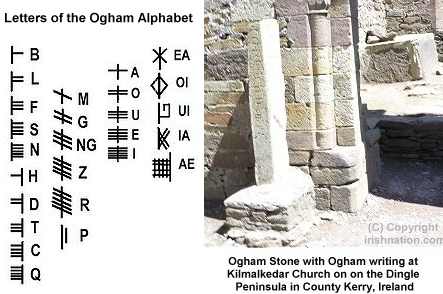
The transition to the use of the Roman alphabet took place about the sixth century. Most examples of Ogham writing confer the name of person that they represent, thus the stones are often memorial symbols. When carved on stones the first letter was at the base and the inscription read from the bottom up. Ogham is occasionally called the 'Celtic Tree alphabet' as many of the letters of Ogham refer to trees. The origin of Ogham is unclear with some scholars suggesting that the language was invented to allow the native Irish communicate in code that the Roman Britons would not understand. Other scholars contend that the language is of Christian origin and exists as a means of religious communication. |
KEEP THIS NEWSLETTER ALIVE!
Solve your gift problem at: https://www.irishnation.com

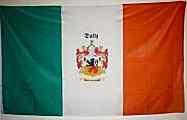
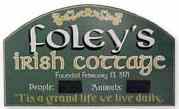
==============================
GAELIC PHRASES OF THE MONTH
==============================
| PHRASE: | Ba mhaith liom cupan tae | ||||||||||||
| PRONOUNCED: | Buh wah lum cup-onn tay | ||||||||||||
| MEANING: | I would like a cup of tea| PHRASE: |
Le bainne agus siucra? |
PRONOUNCED: |
Leh bonn-yeh ogg-us shu-kreh |
MEANING: |
With milk and sugar? |
PHRASE: |
Ta se ro-lag/ro-laidir/an dheas |
PRONOUNCED: |
Taw shay ro-logg/ro-law-dirr/on djas |
MEANING: |
It is too weak/too strong/just nice |
|
View the archive of phrases here:
https://www.ireland-information.com/irishphrases.htm
====================
COMPETITION RESULT
====================
The winner was:
who will receive the following: cmneale@optusnet.com.au
A Single Family Crest Print
(US$24.99 value)

Send us an email to claim your print, and well done!
Remember that all subscribers to this
newsletter are automatically entered into the
competition every time.
I hope that you have enjoyed this issue.

by Michael Green,
Editor,
The Information about Ireland Site.
https://www.ireland-information.com
Click here to contact us
Google+
KEEP THIS NEWSLETTER ALIVE! Visit https://www.irishnation.com
(C) Copyright - The Information about Ireland Site, 2015
P.O. Box 9142, Blackrock, County Dublin, Ireland Tel: 353 1 2893860